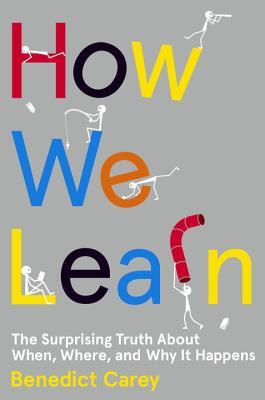Thursday, September 25, 2014
-

 No comments
No comments

 No comments
No comments
How We Learn
Rating: 4.5 Stars
Version: Netgalley eBook
Version: Netgalley eBook
Author: Benedict Carey
Netgalley Summary:
In the tradition of The Power of Habit and Thinking, Fast
and Slow comes a practical, playful, and endlessly fascinating guide to what we
really know about learning and memory today—and how we can apply it to our own
lives.
From an early age, it is drilled into our heads: Laziness,
distraction, and ignorance are the enemies of success. We’re told that learning
is all self-discipline, that we must confine ourselves to designated study
areas, turn off the music, and maintain a strict ritual if we want to ace that
test, memorize that presentation, or nail that piano recital.
But what if almost everything we were told about learning
is wrong?
And what if there was a way to achieve more with less
effort?
In How We Learn, award-winning science reporter Benedict
Carey sifts through decades of education research and landmark studies to
uncover the truth about how our brains absorb and retain information. What he
discovers is that, from the moment we are born, we are all learning quickly,
efficiently, and automatically; but in our zeal to systematize the process we
have ignored valuable, naturally enjoyable learning tools like forgetting,
sleeping, and daydreaming. Is a dedicated desk in a quiet room really the best
way to study? Can altering your routine improve your memory? Are there times
when distraction is good? Is ignorance always bad? Is repetition necessary?
Carey’s search for answers to these questions yields cunning strategies that
make learning more a part of our everyday lives—and less of a chore.
By road testing many of the counterintuitive techniques
described in this book, Carey shows how we can flex the neural muscles that
make deep learning possible. Along the way he reveals why teachers should give
final exams on the first day of class, why it’s wise to interleave subjects and
concepts when learning any new skill, and when it’s smarter to stay up late
prepping for that presentation than to rise early for one last cram session.
And if this requires some suspension of disbelief, that’s because the research
defies everything we’ve been told, throughout our lives, about how best to
learn.
The brain is not like a muscle, at least not in any
straightforward sense. It is something else altogether, sensitive to mood, to
timing, to circadian rhythms, as well as to location and environment. It
doesn’t take orders well, to put it mildly. If the brain is a learning machine,
Benedict Carey asserts, then it is an eccentric one. In How We Learn, he shows
us how to exploit its quirks to our advantage.
Review:
To be honest, I've been looking for a book like this for a
while. Not too long ago, I started reading “Thinking Fast and Slow”, but it
couldn’t hold my attention long enough for me to finish it. I’ll admit, there
were spots in this book that were a bit dry, but overall it was packed full of
knowledge that was truly interesting. For instance, I really like how the
author included a few brain teasers, as well as some truly bizarre brain
experiments (splitting the brain, removing the hippocampus, etc…). By the way,
I felt absolutely horrible for the poor guy with no hippocampus. Not sure what a hippocampus is? Read this
book :P!
One thing I really liked about this book, was the fact
that it affirmed notations I’ve often thought true, but were unable to
scientifically backup, as well as supported advice I’ve heard throughout the
years. For instance, there really is a science behind taking a break when
you’re stumped on a problem, instead of attempting to just power through. Also,
who would have known that forgetting is actually helpful? It turns out, that
forgetting is the brains way of employing a spam filter, which allows the most
important or relevanant information to stay available. Also interesting was the
“Forget to Learn” theory, which basically stated that when information is
stored, it’s never truly lost, but simply governed by the strength of the
storage and retrieval ability that’s linked with that specific memory. Even
more interesting, if not partially embarrassing, were the moments that I’ve
personally experienced. For example, the false sense of fluency and/or
misplaced confidence when prepping for a test, only to realize on test day that
you don’t know half as much as you thought you did.
One thing that really stands out about this book, is the
simple fact that it was written to be applicable to daily life. Unlike other
books I’ve read, which were jammed with scientific terminology and theory, “How
We Learn” was written for the everyday reader. This book provides you with tips
to help you with studying and recall, which actually go against what we hear
today. For instance, take the nap, study with music, and change up your study
location/time.
Additionally, I took off .5 of a star, because the
majority of the book was about recall, which isn't exactly learning.. plus it
took me many start-and-go sessions to finish it. However, it's worth it, start
reading :).
I’m certainly glad that I happened to run across this book
and will be looking for a hardcopy in the near future. As for all my readers, I
highly, highly, suggest purchasing a copy of this book.

0 comments :
Post a Comment